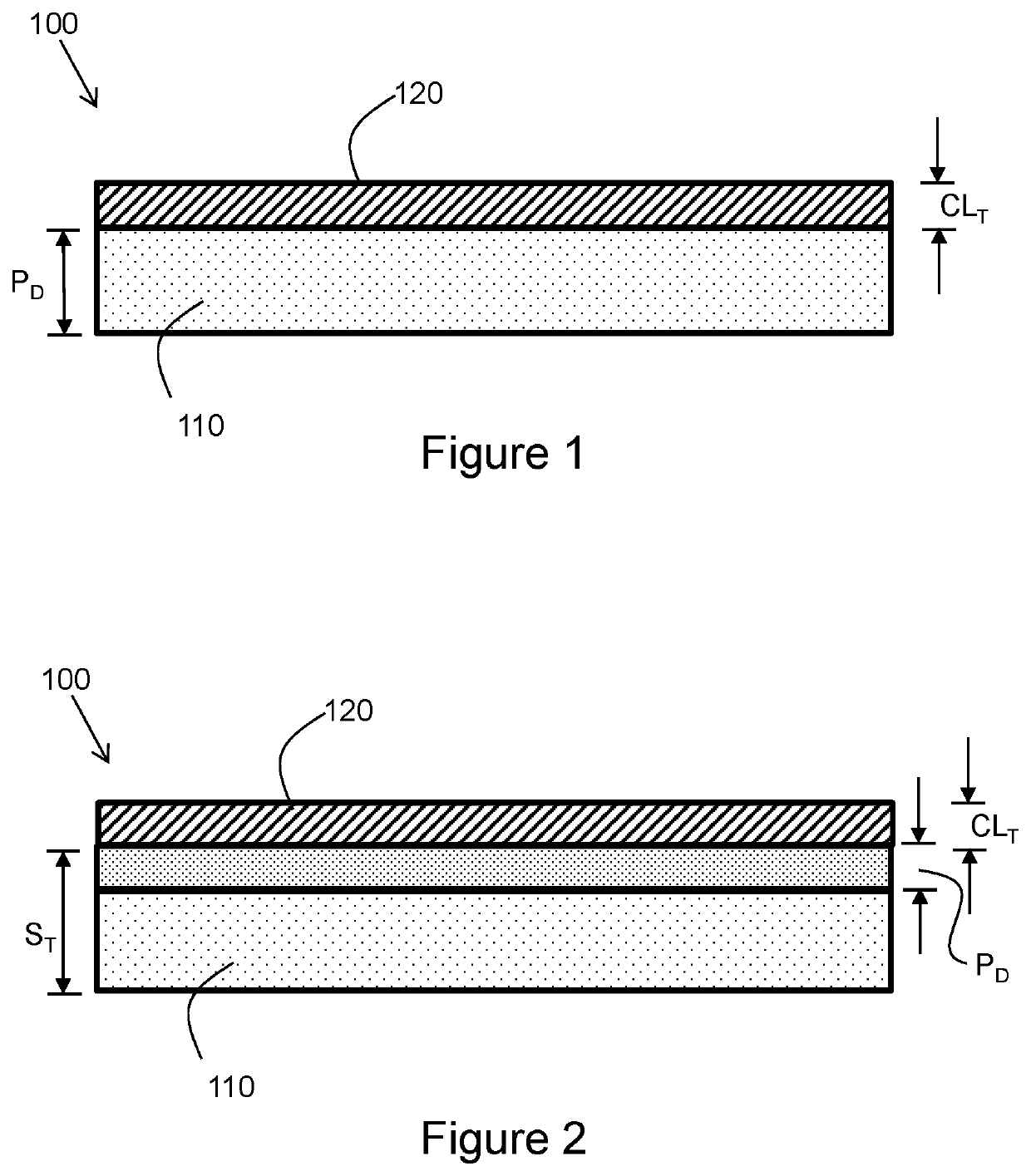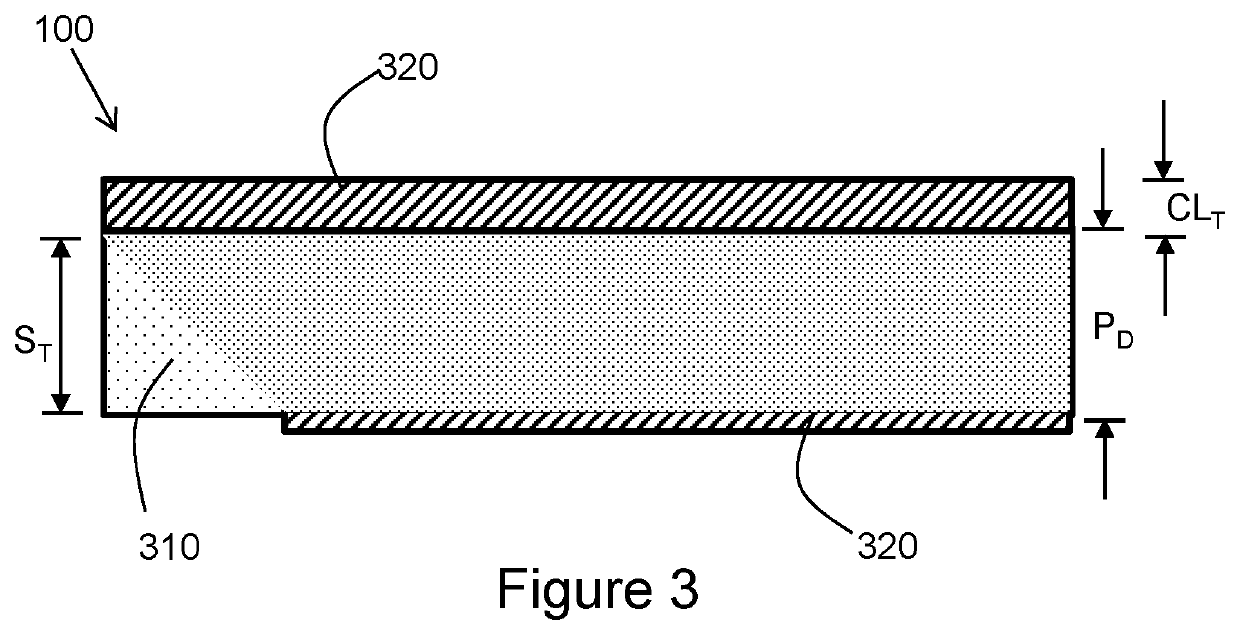Vapor retarding building materials and methods for making them
a technology of building materials and vapor retarding technology, applied in the field of vapor retarding building materials and methods for making them, can solve the problems of high permeability, difficult and expensive commercial scale processes, and achieve low cost, simple and cost-effective, and low water vapor permeability
- Summary
- Abstract
- Description
- Claims
- Application Information
AI Technical Summary
Benefits of technology
Problems solved by technology
Method used
Image
Examples
example 1
[0085]A polymeric coating layer of Example 1 is provided in Table 1. The wet wt % values for the components are based on total wet weight of the liquid formulation from which the polymeric coating layer was coated; the dry wt % for the components are based on total dry weight of the polymeric coating layer composition.
[0086]
TABLE 1FormulationFormulationComponentTrade Name (Manufacturer)(wet wt %)(dry wt %)StyreneRovene 400264.3155.49butadiene latex(Mallard Creek)Kaolin claySnobrite 75 (Unimin)25.2543.58WaterTap water9.460DispersantTamol 1124 (Dow)0.880.76DefoamerSurfynol DF-580.100.17(Air Products)
[0087]The coating composition of Example 1 was coated onto 40 lb Kraft paper. This article was tested, and at a thickness of 55 microns it exhibited: 0.65 Perm at 25% RH; 1.2 Perm at 45% RH; 6.1 Perm at 75% RH; 26 Perm at 95% RH
example 2
[0088]A polymeric coating layer of Example 2 is provided in Table 2. The wet wt % values for the components are based on total wet weight of the liquid formulation from which the polymeric coating layer was coated; the dry wt % for the components are based on total dry weight of the polymeric coating layer composition.
[0089]
TABLE 2Trade NameFormulationFormulationComponent(Manufacturer)(wet wt %)(dry wt %)Styrene acrylic latexPolidisp 760253.245.9(Resiquimica)Kaolin clayPrimatec (Sibelco)30.151.9WaterTap water14.90TiO2XFast White 00250.581.0(BASF)HALS stabilizerTinuvin 292 (BASF)0.190.3DispersantTamol 1124 (Dow)0.900.8DefoamerSurfynol DF-580.10.1(Air Products)
[0090]The polymeric coating composition of Example 2 was coated onto Radici 50, which is a 50 g / m2 polypropylene non-woven sheet produced by RadiciGroup (Gandino, Italy). This article was tested, and its permeance was 0.99 Perm at 25% RH; 3 Perm at 45% RH; 12 Perm at 75% RH; 44.5 Perm at 95% RH. Certain target values listed in T...
examples 3-24
[0093]Examples 3-24 provide a vapor retarding article according to certain embodiments of the disclosure. These articles were prepared as follows. First, the polymeric coating composition was prepared by initially stirring tap-water, defoamer (if present), and dispersant (if present). The amount of water is determined based on the desired solids percent. Next, the hydrophobic polymer was added and mixed for about one minute with a Cowles blade at moderate shear rates. The inorganic hydrophilic particulate filler (e.g., kaolin and / or alumina trihydrate (ATH)) was then added while simultaneously mixing with a Cowles blade. Mixing is continued for a few minutes after all of the particulate filler has been added. The polymeric coating composition was then coated on the substrate using Mayer rod (size 50) method. The prepared articles were tested, and their performance is provided in Table 5.
[0094]The hydrophobic polymer latexes used include: styrene acrylic latex Primal P-308 (from Dow)...
PUM
| Property | Measurement | Unit |
|---|---|---|
| median particle size | aaaaa | aaaaa |
| thickness | aaaaa | aaaaa |
| RH | aaaaa | aaaaa |
Abstract
Description
Claims
Application Information
 Login to View More
Login to View More - R&D
- Intellectual Property
- Life Sciences
- Materials
- Tech Scout
- Unparalleled Data Quality
- Higher Quality Content
- 60% Fewer Hallucinations
Browse by: Latest US Patents, China's latest patents, Technical Efficacy Thesaurus, Application Domain, Technology Topic, Popular Technical Reports.
© 2025 PatSnap. All rights reserved.Legal|Privacy policy|Modern Slavery Act Transparency Statement|Sitemap|About US| Contact US: help@patsnap.com


